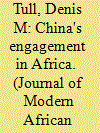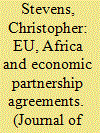|
|
|
Sort Order |
|
|
|
Items / Page
|
|
|
|
|
|
|
| Srl | Item |
| 1 |
ID:
073996


|
|
|
|
|
| Publication |
2006.
|
| Summary/Abstract |
China's vastly increased involvement in Africa over the past decade is one of the most significant recent developments in the region. It appears to contradict the idea of international marginalisation of Africa and brings significant economic and political consequences. China's Africa interest is part of a recently more active international strategy based on multipolarity and non-intervention. Increased aid, debt cancellation, and a boom in Chinese-African trade, with a strategic Chinese focus on oil, have proven mutually advantageous for China and African state elites. By offering aid without preconditions, China has presented an attractive alternative to conditional Western aid, and gained valuable diplomatic support to defend its international interests. However, a generally asymmetrical relationship differing little from previous African-Western patterns, alongside support of authoritarian governments at the expense of human rights, make the economic consequences of increased Chinese involvement in Africa mixed at best, while the political consequences are bound to prove deleterious.
|
|
|
|
|
|
|
|
|
|
|
|
|
|
|
|
| 2 |
ID:
073991


|
|
|
|
|
| Publication |
2006.
|
| Summary/Abstract |
This article evaluates Western, and particularly British, policy towards Africa in the wake of the 2005 Commission for Africa, and considers what it tells us about the character of liberal internationalist policy towards the continent. The article reviews the Commission's report, Our Common Interest, and argues that it adheres in important respects to a 'liberal bargain' which has been at the heart of wider donor policy for some time. However, it goes on to argue that the kind of historical leap forward envisaged for Africa has strong echoes in nineteenth-century Western liberal forays into the continent. Yet there are lessons to be learned, and historical legacies to be confronted, from this earlier encounter. These come to the fore in the issue of governance and the difficult political issues that need to be confronted if the Commission's aims are to be realised.
|
|
|
|
|
|
|
|
|
|
|
|
|
|
|
|
| 3 |
ID:
073995


|
|
|
|
|
| Publication |
2006.
|
| Summary/Abstract |
Sub-Saharan African (SSA) is negotiating a new trade regime with the European Union (EU), under the threat of increased barriers against its exports if agreement is not reached before 2008. This article examines the potential impact on regional integration of the Economic Partnership Agreements (EPAs) being negotiated. Both sides pay lip service to greater regional integration, which is a stated objective of EPAs. But the article provides research evidence suggesting that EPAs will weaken regionalism, and in so doing adds to the literature on what happens when external powers attempt to use leverage to press trade policy change. Based on an analysis of SSA's trade with the EU, the article shows that countries may be encouraged to reinforce rather than eliminate barriers to the free circulation of goods between them, because of the choices they make in the details of their trade regimes with Europe. It also establishes a methodology that can be applied to new data as the negotiations progress.
|
|
|
|
|
|
|
|
|
|
|
|
|
|
|
|
| 4 |
ID:
073992


|
|
|
|
|
| Publication |
2006.
|
| Summary/Abstract |
The 2003 Comprehensive Peace Agreement (CPA) and the ensuing two-year-long National Transitional Government of Liberia (NTGL), which brought together two rebel forces, the former government and members of civil society, justifiably had many critics but also one positive and possibly redeeming feature. In spite of, or perhaps because of, the realpolitik nature of the CPA and the barely disguised gross corruption of the members of the coalition government, the protagonists in the second Liberian civil war (2000-03) complied with the agreement and the peace process held. The culmination of this sequence of events was the 11 October 2005 national elections, the 8 November presidential run-off and the 16 January 2006 inauguration. In several ways, this was the African post-conflict election that broke the mould, but not just in that a woman, Ellen Johnson-Sirleaf, won the presidential race, and a football star, George Weah, came second. The virtual absence of transformed rebel forces or an overbearing incumbent in the electoral races, partially as a result of the CPA and NTGL, gave these polls extraordinary features in an African setting.
|
|
|
|
|
|
|
|
|
|
|
|
|
|
|
|
| 5 |
ID:
073993


|
|
|
|
|
| Publication |
2006.
|
| Summary/Abstract |
This paper discusses the logic of political identification by individuals and groups in the context of re-emerging state structures in northern Somalia. Current identities are analysed as political identities, which are both a product of and a driving force behind political and military conflict in the region. In everyday life political cleavages can be bridged by cross-cutting ties based on neighbourhood, intermarriage or common experiences and history. Only when conflict reaches a certain level and violence escalates, do political identities become mutually exclusive and large-scale fighting become a real threat.
|
|
|
|
|
|
|
|
|
|
|
|
|
|
|
|
| 6 |
ID:
073994


|
|
|
|
|
| Publication |
2006.
|
| Summary/Abstract |
The Liberian civil war was the major issue in US-Guinea relations between 1990 and 2003. During the first half of this period, the US sought with limited success to secure Guinea's cooperation in finding a diplomatic solution. President Conté viewed Charles Taylor as Guinea's implacable enemy and authorised arms support for anti-Taylor factions, while the US pressed for a negotiated peace. The Guinean leader's negative reaction to US criticism of the flawed 1993 presidential elections halted most dialogue on Liberia for the next two years. When Taylor continued supporting civil war in Sierra Leone after 1997, and fighters allied to him assaulted Guinea border posts in 1999, the US strengthened its engagement with Guinea. Providing military training and non-lethal equipment, it sought to counter the threat that Guinea would succumb to the destabilisation which had afflicted Liberia and Sierra Leone. The US appears positioned to play a positive role in Guinea's political and economic transition after the departure from the scene of the seriously ill Guinean president.
|
|
|
|
|
|
|
|
|
|
|
|
|
|
|
|
|
|
|
|
|